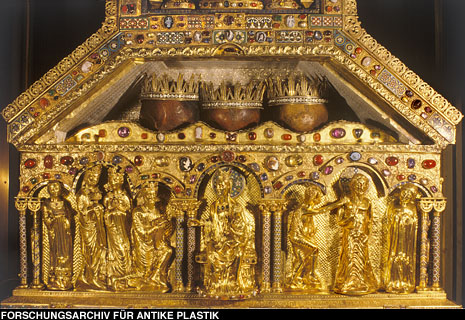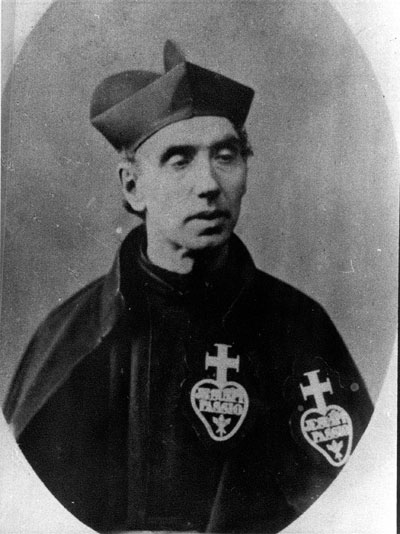
Oh to be in Turin today! The festivities at the Basilica of Mary, Help of Christians will, no doubt, be wonderful as the Salesians celebrate the feast of St John Bosco. I remember with fondness the Fraternity pilgrimage to Turin for the Exposition of the Holy Shroud a few years ago when we also had the joy of visiting the Basilica and venerating the sacred remains of Don Bosco and of celebrating Holy Mass in the crypt - it was wonderful. Anyone who has visited the Basilica can testify to its air of prayerfulness and beauty.
Don Bosco was a most remarkable man as you all know. He was a fervent apostolic figure, founding the Salesians, writing and serving the young, but he was also a mystic, experiencing various visions and dreams many of which proved to be prophetic and of great assistance to many, particularly today. He must be one of the first saints to be photographed so much - we have lots of photos and these appear to reveal a hearty soul in love with life.
There was something extraordinary about him and many who knew him acknowledged it. But are we surprised? He was surrounded by Saints and he helped produce Saints. His mother is on the path to beatification, priest friends who formed him have already been canonised - St Joseph Cafasso being one. His next door neighbour in Turin is a Saint - St Joseph Cottolengo. Two of his students have been canonised: St Dominic Savio and St Luigi Orione. His co-foundress is also canonised, St Mary Mazzarello, and some of his companions in the Society are on the way to canonisation, Blessed Michael Rua being one. So Don Bosco and sanctity seem to go hand in hand: he lived in a community of holiness - surely that is the best example for all of us since we are all called to live in a community of holiness where each is to be sanctified.
There is a wonderful story about Don Bosco and St Joseph Cottolengo which shows the holy trust in God of the latter and the holy resourcefulness of the former. St Joseph founded the Little House of Divine Providence where he cared for the poor of Turin. In his deep trust, he resolved to end the day penniless and allow divine providence provide for the next. So each night before he went to bed he took what was left of the finances, put them in a bag and threw it out the window for some poor soul who might be passing. Of course there was a poor soul passing, and he passed every evening at that particular time waiting for the bag of money to be tossed out - Don Bosco! St Joseph's "excess" was put to good use for the boys, and each morning the Little House of Divine Providence found enough money to get it through the day with a little left over for its holy founder to toss out the window later that night.
At the moment relics of Don Bosco are circling the globe as part of the preparations for the bicentenary of his birth which will take place in 2015. That will be some year as it is also the 500th anniversary of our foundress's birth. The relics will visit our diocese in March, so we look forward to that.
In other news. Mary O'Regan has an excellent article on the struggle for life here in Ireland: she reflects on Enda Kenny and the difficulties he is creating not only within Irish society, but also within his party. Yet, he has done the pro-life movement a service in uniting them. For years there were tensions between the groups which was sad because there are wonderful, committed and gifted people in each of the pro-life organisations. Now they see we have a common enemy and they have decided to work together and, I hope, they are reconciled and their differences will be overcome. The fruit of their reconciliation is the powerful campaign which is emerging from their working together.
We have a long, hard struggle ahead of us so strong bonds must be formed between the various groups to create a powerful pro-life movement in Ireland, one which is so strong that it will be able to face any challenge that comes. There is another important thing - they also need to listen to each other - they all have something to learn from each other. Between them they have huge experience be it legal, social, medical, in terms of lobbying and indeed in terms of dealing with persecution as some pro-life people have been arrested. Public order Acts have been used against pro-life protesters in the past and we can be sure they may well be used again - pro-abortion Taoiseachs, ministers, TDs and senators may well try to quash opposition as they attempt to impose an "Elizabethan settlement" following the passing of legislation.
Here is a very good article on how the Archbishop of Trieste coped when he was confined to his house when it was surrounded by pro-gay marriage supporters - he took the opportunity to sit back, relax and read a good book! There is a lesson for all of us there. The protesters accused him of homophobia and racism because he upholds the universal truth that marriage is between a man and woman. Now could someone please tell me where the racism comes in. How is it racist? I thought we defined maleness and femaleness in terms of gender/sex not race. But it all just goes to show you that logic and common sense have been eradicated in these gender wars. In related news, it seems as things get hotter in the US Bishops have said that they are prepared to go to prison rather than accept Obama's Mandate. It's like the early days of the Church again as Christians are being persecuted by secular authorities because they will not violate their consciences.
And finally, in these days Germany is reflecting on Hitler's rise to power which took place eighty years ago this year with his appointment as Chancellor in 1933. The present Chancellor, Angela Merkel spoke of how the ordinary German people permitted this rise if not by actual support, certainly by their tolerance. Of course not all remained silent: many voices rose in opposition to Hitler and a number of them were Catholic. The great Lion of Munster, Blessed Clemens von Galen preached against the Nazis and suffered for it. Many Catholic priests and religious were interned in concentration camps and murdered because they would not cooperate with the regime and defied it. Simple actions like hanging a crucifix was enough to raise the wrath of the Nazis and bring a death sentence on your head as Blessed Restituta Kafka found out. There are many lessons to be learned from this period of history and unfortunately we see history repeating itself now in our modern society and few take any notice. I sometimes wonder if human beings are not just a little bit thick - it seems so difficult for us, and particularly those in power, to learn from the mistakes of the past. I suppose we can put that down to Original Sin.













